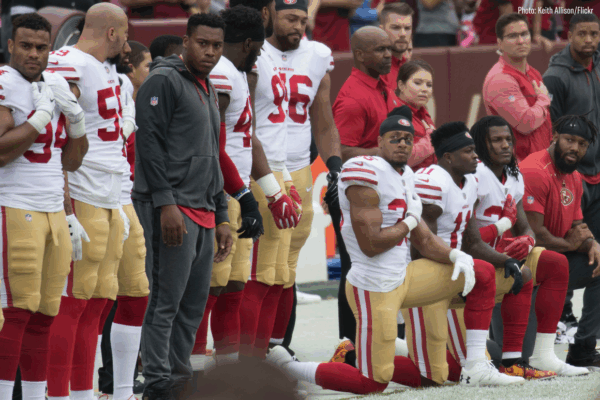By Henry Haggard, seventh grader, Tuckahoe Middle School
“Tell me, whether you can hereafter love, honour, and faithfully serve the power that hath carried fire and sword into your land?” - Thomas Paine, Common Sense
In 2016, Colin Kaepernick, then quarterback for the NFL’s San Francisco 49ers, began kneeling in protest during the National Anthem, causing a lot of controversy. His act of protest started to build momentum when other players followed his lead. He and his followers continued to kneel as a protest for injustice, but some believe these players have crossed a line.
“I am not going to stand up to show pride in a flag for a country that oppresses black people and people of color," Kaepernick said. Are the football players being reasonable? Is this worth it? Is it an issue of free speech or patriotism? What must we do to get our ideas heard or make a difference?
I am a seventh grader at Tuckahoe Middle school, and I have noticed many of the injustices in the world. As a result, I sit for the pledge in protest. Some names I’ve been called for doing so include: idiot, retarded, autistic, communist, commie, and socialist. Some of these names have been said straight to my face, others behind my back. Some of my classmates say I am disrespectful to the troops, but does the flag represent the troops, or does it represent the people as a whole? I believe the latter, and if the people aren’t treated fairly, I will protest.
It is a well known fact that every morning public schools across the country recite the Pledge of Allegiance, which says: “I pledge allegiance to the flag of the United States of America and to the Republic for which it stands, one Nation under God, indivisible, with liberty and justice for all.” I feel this is too similar to times in the past when schoolchildren were made to recite the Bible in prayer before class. Students should have the individual right to pray in school, but including God in the morning pledge does not seem an apt separation of church and state, and it may be threatening to polytheists or atheists.
From a purely constitutional standpoint, the American Civil Liberties Union has something to say on the issue of free speech. ACLU national Deputy Legal Director Jeffery Robinson stated, “Respect and love for America doesn’t require blindness to America’s failure to honor its promise of racial justice and equality [...] Kaepernick silently knelt, making no attempt to disrupt the singing of the anthem. He did not try to prevent anyone from standing. This textbook nonviolent protest is totally American.”
Many organizations stand with the ACLU in this sense. What does seem un-American though, are President Donald Trump’s numerous threats to Kaepernick’s free speech. No matter how empty the president’s threat is, no one, especially a governmental figure, can obstruct these freedoms.
Some have mentioned in Kaepernick's favor that forced patriotism is not true patriotism, as referenced in the ACLU’s slogan, “Dissent is patriotic.” Many believe that America should work to become the country that everyone wants and chooses to stand for, not that of the oppressors who force it.
In essence, Colin Kaepernick has definitely caused some controversy. Some people believe that his form of protest is disrespectful and should be stopped; some believe that it is the highest form of respect; some believe free speech is the top priority whether or not it’s respectful, and for others it’s a combination.
Whatever you think about Kaepernick and the pledge, and however you choose to demonstrate your beliefs, we the people, united as a country, must fight the ongoing injustice - not only racist individuals, but subtly racist fundamental laws make minorities so disadvantaged. Learn the truth and how to take action to stop inequality with these resources:
Police Practices Reform Advocacy Toolkit
Voting Rights Advocacy Toolkit
Justice in Prosecutions Advocacy Toolkit
Fundraising and Events Advocacy Toolkit
This guest blog reflects the writer's views and not necessarily those of the ACLU of Virginia.

